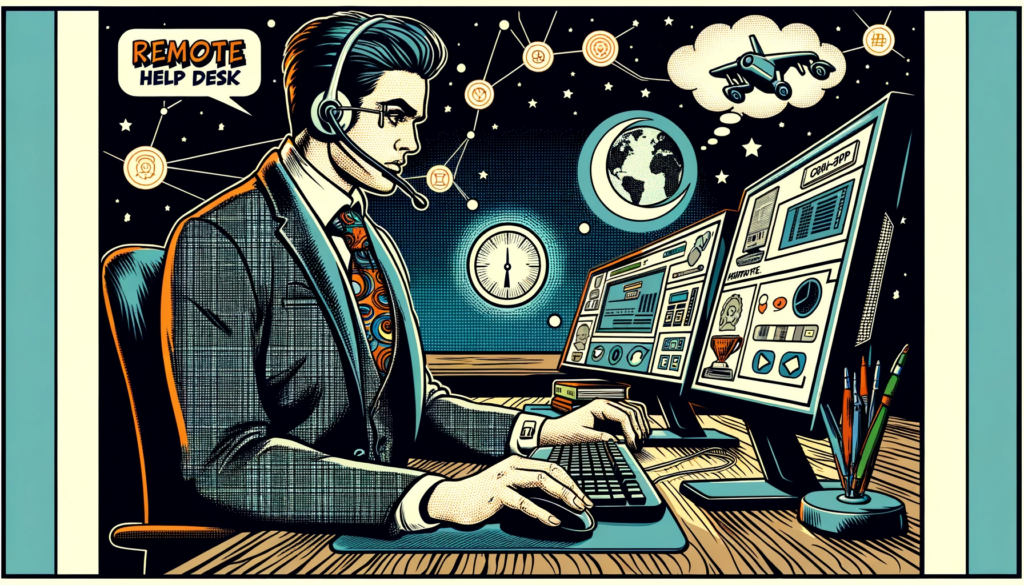Welcome to Support Adventure, where we specialize in matching IT talent with global opportunities. As pioneers in remote IT jobs (at night), we understand the intricacies of time zone challenges and the unique lifestyle of night shift remote work. Our MSP Staffing Company’s guide will guide you how to navigate them best!
With the world being so interconnected, the opportunity to work in a different time zone from the comfort of your home has become a reality for many IT professionals. We’re here to guide you through the dynamics, benefits, and challenges of engaging in remote IT jobs across different time zones.
Understanding the Demand for Remote IT Jobs at Night
The need for continuous IT support has created a niche for remote IT jobs at night. Companies around the world are looking for skilled professionals who can work in time zones opposite to their operational hours.

Popular remote IT jobs to do on a night shift include network monitoring and support, cloud services management, cybersecurity monitoring, help desk and technical support roles, and system administration tasks. These roles are crucial for maintaining continuous IT operations and ensuring client satisfaction across different time zones.
Having 24/7 IT support has become an imperative. If local staff are employed to do night shifts, they could be too tired, losing concentration, lowering the quality of their work.
This rising demand opens up a world of opportunities for those willing to navigate the night shift in the IT domain from different time zones!
Remote IT Jobs at Night – Time Zone Dynamics
Navigating time zone challenges is a key aspect of remote IT work at night. For that reason, we’ve devised a list where you can see the opposite work shifts – work the night shift on your day shift!
Here’s a closer look with specific examples:
- Eastern Standard Time (EST): Ideal for supporting Asian clients during their daytime. For instance, if you’re based in New York or Florida, you could provide nighttime support for companies in China, Japan, or Singapore, where it’s their busy daytime hours.
- Pacific Standard Time (PST): Offers opportunities to work with European businesses during their peak hours. Living in California or Washington state, you could find yourself supporting IT operations in France, Germany, or the UK during your night, which is their morning and early afternoon.
- Central European Time (CET): Aligns well with North American clients’ daytime needs. If you’re in places like Germany, Spain, or Italy, you can support clients in states like Texas or Illinois in the U.S., helping them tackle IT issues during their daytime while you work at night.
- Australian Eastern Standard Time (AEST): Perfect for assisting American companies during their morning rush. Being in Sydney or Melbourne, you could offer support to businesses on the U.S. West Coast, such as in California or Oregon, as they start their workday.
- Indian Standard Time (IST): A strategic position for supporting both American and European clients. From cities like Mumbai or Bangalore, IT professionals can assist clients in both the U.K. during their afternoon and the U.S. East Coast during their morning hours.
Helpful Websites for Navigating Work in Different Time Zones
You can use helpful websites that can aid you in navigating time in different time zones such as World Time Buddy or Time and Date. By understanding these dynamics, IT professionals can strategically position themselves for optimal opportunities. Moreover, you can travel the world and switch between day and night shifts so you can explore as you please!
This table serves as a guide for IT professionals considering remote work in different time zones. It shows potential locations where professionals could be based, the regions they could support remotely, and typical IT roles that might be performed during night shifts in those locations. This reflects the dynamic and global nature of remote IT work.
| Time Zone | Location Examples | Ideal Remote Work Regions | Typical IT Roles for Night Shift |
|---|---|---|---|
| EST (Eastern Standard Time) | New York, Florida | Asia (China, Japan, Singapore) | Network Support, System Administration |
| PST (Pacific Standard Time) | California, Washington | Europe (UK, Germany, France) | Software Development, Technical Support |
| CET (Central European Time) | Germany, Spain, Italy | North America (Texas, Illinois) | Help Desk Support, Cybersecurity Monitoring |
| AEST (Australian Eastern Standard Time) | Sydney, Melbourne | USA West Coast (California, Oregon) | Cloud Services Management, IT Consulting |
| IST (Indian Standard Time) | Mumbai, Bangalore | USA East Coast, Europe (UK) | Data Analysis, Network Monitoring |
Matching Skills with Global IT Demands
In the realm of night shift remote work, technical prowess is just the beginning. Adaptability, cultural sensitivity, and exceptional communication skills are crucial in bridging time zone challenges. These skills are invaluable when providing real-time support to clients across the globe.

- Adaptability and Flexibility: The ability to quickly adjust to changing situations and client needs is key. This includes adapting to different working hours and being able to troubleshoot issues outside of your usual expertise.
- Cultural Sensitivity: Understanding and respecting cultural differences ensures smoother interactions with clients from diverse backgrounds. This skill is essential for building trust and rapport, particularly when you can’t meet face-to-face.
- Exceptional Communication Skills: Clear, concise communication is critical, especially when explaining complex technical concepts to clients who may not have a technical background. This also includes being an active listener to truly understand client concerns.
- Rest and Focus Advantage: Working in a time zone opposite to that of your clients means you can be well-rested and more focused during your shift. This gives you a significant advantage in terms of alertness and productivity compared to someone working odd hours in their local time zone.
- Cultural Compatibility: Being able to align with the cultural norms and work styles of your clients can set you apart. This means understanding their work ethics, communication styles, and business etiquette.
- Creativity and Problem-Solving: In remote IT roles, you often have to think outside the box to solve complex issues. Your ability to come up with creative solutions can be a game-changer.
- Technical Intelligence: Beyond basic IT knowledge, understanding the latest trends, tools, and technologies in the IT industry will make you a more desirable candidate.
- Self-Discipline and Time Management: These are essential for managing your tasks efficiently, especially when working unsupervised during the night.
- Empathy and Customer Service Orientation: Showing empathy towards clients’ issues and having a strong desire to help improves client satisfaction and fosters long-term relationships.
- Learning Agility: The willingness and ability to quickly learn new skills and technologies is vital in the ever-evolving IT landscape.
By honing these skills and traits, you can bridge the gap between what you offer and what global clients need. Understand the company’s values and demonstrate how your unique combination of skills, particularly your advantage of working in an opposite time zone, makes you an ideal candidate. This approach not only sets you apart from other candidates but also positions you as a valuable asset to any global IT team.
Success Stories in Remote IT Jobs at Night
At Support Adventure, we’re proud to have a rich tapestry of success stories featuring professionals who have mastered the art of thriving in night-shift remote work. These inspiring tales span across continents, from South Africa to Asia, to South America, showcasing how our staff have adapted to working in opposite time zones with remarkable success.
- South Africa’s Night Owls: In South Africa, we have seen IT professionals who have seamlessly integrated into teams based in Europe and North America. For example, a network administrator based in Johannesburg has been supporting a tech firm in New York. Working in GMT+2, he starts his shift in the late evening, which coincides with the morning hours in New York. His ability to provide real-time solutions during the U.S. business hours has made him an invaluable asset to the team.
- Asia’s Tech Wizards: In Asia, our remote workers have demonstrated incredible adaptability. Take, for instance, a software developer in Thailand working for a client in Silicon Valley. Operating in IST, she starts her day when it’s late afternoon in California, offering critical development support during the peak hours of her client’s workday. Her proficiency in managing time zone differences has led to increased productivity and enhanced collaboration.
- South America’s IT Champions: In South America, IT professionals have shown how geographical distance is no barrier to effective teamwork. A case in point is a help desk technician in Brazil who supports a London-based company. He works in BRT, starting early in his evening to align with the start of the day in London. His proactive approach in resolving IT issues as they arise during the UK daytime has significantly improved client satisfaction.
Overcoming the Challenges of Night Shift Work
While the benefits of remote IT jobs at night are numerous, they come with their own set of challenges. Setting up an effective workspace, maintaining work-life balance, and ensuring physical and mental well-being are paramount. We provide tips and strategies for successfully navigating these challenges.

Sleep hacks for people working in the IT industry:
- Create a Comfortable Workspace: Set up your workspace in a quiet area of your home. Invest in ergonomic furniture, adequate lighting, and technology that supports your work needs.
- Maintain a Consistent Schedule: Stick to a regular sleep schedule, even on your days off. This helps regulate your body’s clock and can improve your sleep quality.
- Invest in Quality Sleep: Make your bedroom conducive to sleep with blackout curtains, comfortable bedding, and a cool temperature. Consider using white noise machines or earplugs to block out daytime noise.
- Balanced Diet and Hydration: Eat balanced meals and stay hydrated. Avoid heavy meals and excessive caffeine, especially closer to your bedtime.
- Regular Breaks and Exercise: Take short breaks during your shift to stretch or do light exercises. Regular physical activity can help reduce stress and improve sleep quality.
- Limit Light Exposure Before Bed: Reduce exposure to blue light from screens at least an hour before bed. This helps signal to your body that it’s time to wind down.
- Effective Stress Management: Practice stress-reduction techniques such as deep breathing, meditation, or yoga. Managing stress effectively can improve sleep and overall well-being.
- Social Connections: Maintain social connections with friends and family, even if it requires planning. Social support is crucial for mental health.
- Professional Health Support: Don’t hesitate to seek professional help if you’re struggling with sleep disorders or other health issues related to night shift work.
- Work Prioritization and Time Management: Manage your workload effectively and prioritize tasks to reduce work-related stress.
- Utilize Natural Light: Whenever possible, expose yourself to natural light during waking hours to help maintain your circadian rhythms.
- Stay Informed About Sleep Hygiene: Educate yourself on good sleep practices and implement them to enhance the quality of your sleep.
- Plan for Transition Days: If you have days where you transition from night to day schedules, plan activities that will help you adjust more smoothly.
- Create a Pre-Sleep Routine: Develop a relaxing pre-sleep routine to help signal to your body that it’s time to rest.
- Communicate with Employers: If possible, communicate your needs and challenges to your employer. They may offer flexible options or resources for night shift workers.
Implementing these strategies can help mitigate the challenges of working the night shift in remote IT jobs, ensuring both professional success and personal well-being.
How Support Adventure Facilitates Remote IT Jobs at Night
Our expertise at Support Adventure lies in understanding the nuances of night shift work in different time zones. We connect IT professionals with roles that not only match their skills but also align with their lifestyle preferences. Our support network ensures a smooth transition into this unique work arrangement. The secret of our premium MSP staffing services might just be the happiness of our staff!
Engaging in remote IT jobs at night offers an exciting opportunity to work in a global landscape, facing unique time zone challenges. Support Adventure is committed to guiding IT professionals through this journey, helping them navigate the night shift with ease and success.
Ready to embark on an adventure in remote IT work at night? Visit Support Adventure for insights, opportunities, and apply to work with us, building an aspiring career in the world of remote IT jobs.



0 Comments